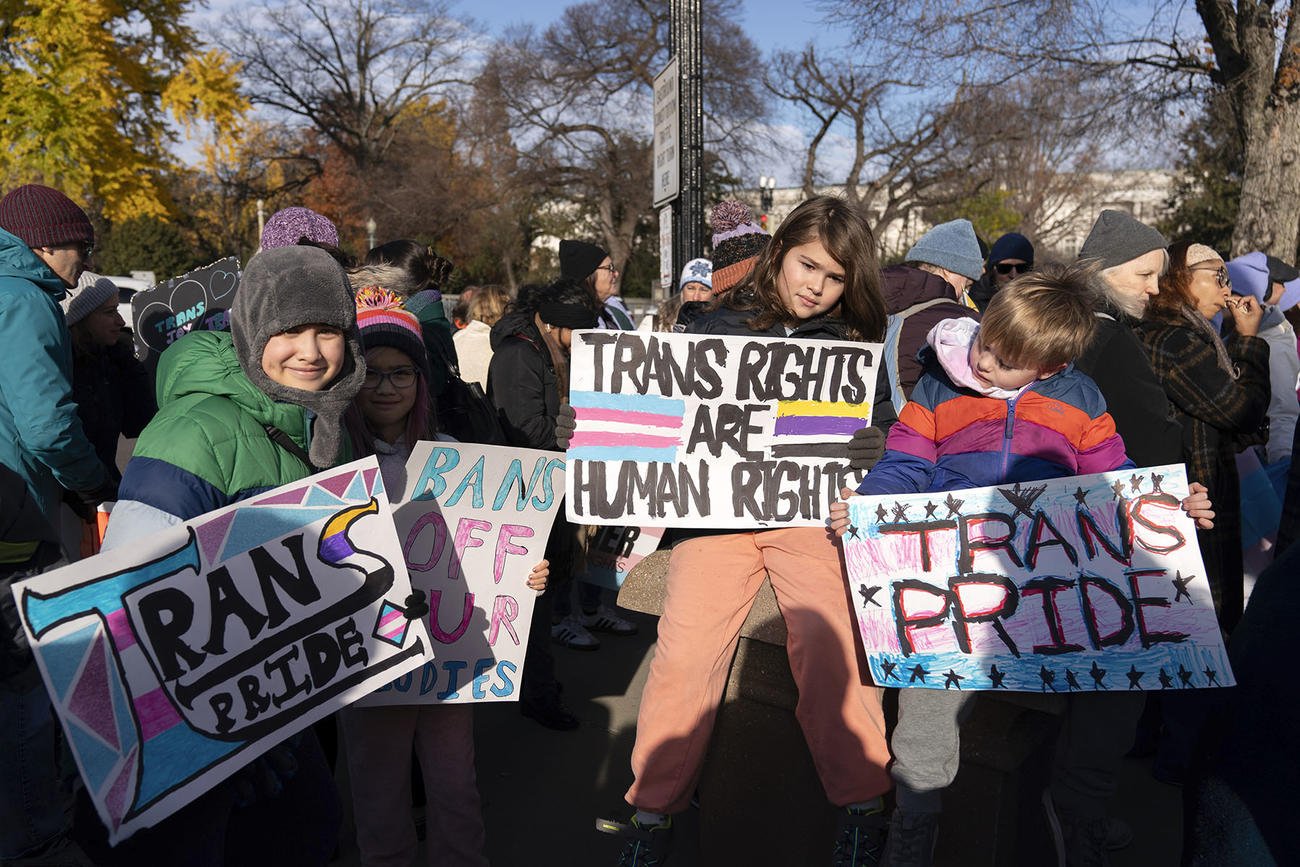
Transgender children of service members could lose access to gender-affirming health care through the military health system under the annual defense bill Congress is expected to approve this month.
This year’s version of the National Defense Authorization Act, or NDAA, that was negotiated by the House and Senate would prohibit Tricare from covering “medical interventions for the treatment of gender dysphoria that could result in sterilization” for beneficiaries under 18. The bill is considered a must-pass piece of legislation since it authorizes special pay and bonuses for troops that would expire at the end of the year if not renewed.
The restriction, which does not specify exactly which treatments would be banned, is somewhat less stringent than an earlier version of the bill that specifically banned Tricare from covering hormone therapy and puberty blockers for minors. But advocates are still warning the final language will harm military families.
Read Next: Compromise Defense Bill Would Give Junior Troops 14.5% Pay Raise in 2025
“Lawmakers are playing politics with the military families’ health care. This is a betrayal of our service members and a threat to national security,” Rachel Branaman, executive director of the Modern Military Association of America, which advocates for LGBTQ+ troops and military families, said in a written statement.
“By forcing families to choose between their military careers and their children’s health care, this bill would lead to decreased military readiness and retention,” Branaman added. “Families have made it clear that they will choose health care for their loved ones over their careers if this provision is passed.”
It’s unclear exactly how many military children would be affected by a ban in Tricare coverage of gender-affirming care for minors. A 2019 study published in JAMA Pediatrics found that more than 2,500 children received some form of transgender-related care through Tricare from 2009 to 2017, including 332 prescriptions for hormones in 2017.
Military.com asked the Defense Health Agency on Monday for current numbers on transgender kids receiving treatment through Tricare, but the agency did not provide them by publication time.
The impending ban on gender-affirming care for military children adds to a fraught time for LGBTQ+ service members and their families as they brace for the incoming Trump administration. President-elect Donald Trump is widely expected to reimpose a ban on transgender troops serving openly.
The NDAA provision also follows a trend of conservative legislators across the country specifically targeting gender-affirming care for transgender children. At least 79 bills were proposed in state legislatures this year to restrict gender-affirming care by age, according to a tracker maintained by the American Civil Liberties Union. Last week, the Supreme Court heard oral arguments in a lawsuit against Tennessee’s ban on hormone therapy for transgender youth.
While medical professionals maintain gender-affirming care for children is safe and necessary, right-wing politicians argue that research is limited and children aren’t mature enough to make decisions about their health care that could have lasting effects.
House Speaker Mike Johnson, R-La., touted the NDAA provision as a major win to “end the radical woke ideology being imposed on our military by permanently banning transgender medical treatment for minors.”
The American Academy of Pediatrics acknowledges that research into long-term risks of puberty blockers on fertility is “currently limited and provides varied results.” Still, the association recommends that transgender youth have access to “comprehensive, gender-affirming and developmentally appropriate health care that is provided in a safe and inclusive clinical space.” The group also recommends that insurance plans “offer coverage for health care that is specific to the needs of youth who identify as [transgender], including coverage for medical, psychological and, when indicated, surgical gender-affirming interventions.”
Transgender service members and military families have faced whiplashing policies for nearly a decade. In 2016, then-President Barack Obama lifted a ban on transgender service members. Also that year, Tricare started covering nonsurgical gender-affirmation care for dependents, though patients could request a waiver for treatment before then.
Then, in 2017 during Trump’s first term, he announced on social media he was reimposing the ban on transgender troops. Trump’s ban took effect in 2019 after some court battles.
When President Joe Biden took office in January 2021, he lifted Trump’s ban as one of his first acts in office. Now, transgender troops are facing down the likelihood of Trump again banning them when he returns to office in January.
Meanwhile, Republicans in Congress have also tried unsuccessfully for years to restrict transgender military service. The original versions of the House and Senate’s NDAAs this year also included language that would have banned gender-affirming care for service members.
While the provisions targeting transgender troops were taken out of the compromise NDAA released this weekend, the restriction on health care for transgender military kids is on track to become the first anti-LGBTQ+ law enacted by Congress since the 1990s, according to the ACLU. In that decade, Congress passed the “Don’t Ask, Don’t Tell” policy that banned gay service members and the Defense of Marriage Act that barred the federal government from recognizing same-sex marriages.
While the bill released this weekend was the result of bicameral, bipartisan negotiations, Democrats are fuming at the outcome.
“Blanketly denying health care to people who clearly need it, just because of a biased notion against transgender people, is wrong,” Rep. Adam Smith, D-Wash., the ranking member of the House Armed Services Committee, said in a statement Sunday. “I urge the speaker to abandon this current effort and let the House bring forward a bill — reflective of the traditional bipartisan process — that supports our troops and their families, invests in innovation and modernization, and doesn’t attack the transgender community.”
The House is scheduled to vote on the bill later this week. The Senate is expected to approve it before the end of the month, after which President Joe Biden would need to sign it into law. The White House has previously blasted efforts to restrict transgender health care in the military, but has not yet publicly commented on the compromise NDAA.
Related: Restrictions on Transgender Health Care Slipped into Senate’s Must-Pass Defense Bill


















